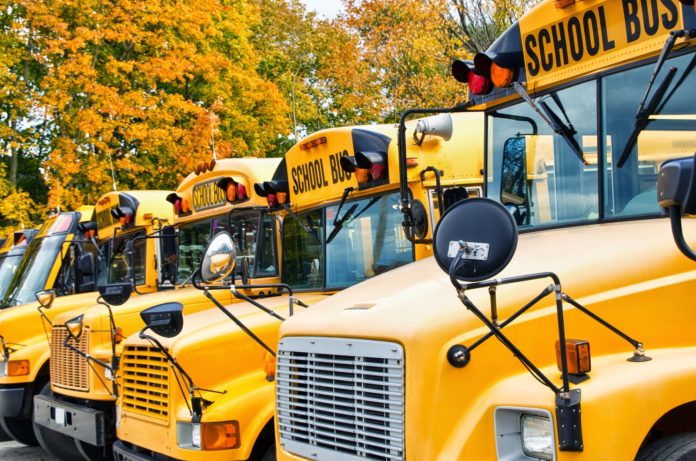Arizona’s school districts should be empowered to reopen campuses for the new school year based on public health data instead of committing now to specific reopening dates, the state’s top education official said.
Superintendent of Public Instruction Kathy Hoffman said Tuesday evening that she outlined her priorities to Gov. Doug Ducey, who is expected to announce the next steps for school reopenings this week.
Ducey, a Republican, previously delayed the start of the school year until at least Aug. 17, weeks after most Arizona schools typically reopen following the summer break.
Ducey’s spokesman, Patrick Ptak, said Wednesday that he is continuing to work closely with Hoffman, school superintendents around the state, education leaders, and the Legislature on a school reopening plan that provides certainty.
“We are listening to members of the education community,” Ptak said in a statement. “The safety of our students, staff, and educators is our top priority. Our goal is ensuring parents have options and schools have stability while giving them the tools and guidance they need to make data-informed decisions.”
Hoffman, a Democrat, outlined several metrics she said would be helpful for school officials to use in deciding when to welcome children back on campus. They included a downward trajectory in new confirmed COVID-19 cases, a decrease in the rate of positive test results, and the widespread availability of testing with timely results.
Schools also need a guarantee of full funding for distance learning, Hoffman said.
“However, we cannot ask schools to make decisions that will impact the teachers’ and students’ health and safety without first providing them with the necessary public health data and funding to make safe decisions,” Hoffman said in a statement on Twitter.
Ducey and his top health official, Dr. Cara Christ, said last week that they would prefer for their own children to return to school on campus. Many districts have released plans for online classes at first, with many hoping to hold in-person school as soon as allowed and others choosing to go at least through October with only online schooling.
Ducey also is expected to announce whether he will let bars and gyms open at the end of the week. He ordered both closed for a month on June 29. He could extend the order, modify it, or let it expire. Face masks are required in public spaces in much of the state as well under local orders Ducey allowed to be issued on June 18.
The expected announcements loom as Arizona officials on Wednesday reported an additional 1,926 confirmed cases of COVID-19 and 56 more deaths. The number of new confirmed cases was down significantly from the previous day’s count of 3,500. Meanwhile, the number of in-patient hospitalizations, intensive care unit beds in use, and ventilators being used remained steady.
Arizona has confirmed 150,609 COVID-19 infection cases overall with 2,974 deaths in the state. The number of infections in Arizona and elsewhere is thought to be much higher because many people have not been tested. Studies suggest people can be infected with the virus without feeling sick.
An Arizona State University researcher said Wednesday that it is becoming clear that cases have plateaued in the state, but at much too high a level to ease up on restrictions, especially bar closures.
“That’s certainly encouraging and certainly much better than it was.,” said Dr. Joshua LaBaer, executive director of the ASU Biodesign Institute. “And I think it affirms that the new direction that the state has gone in, with the new orders to require masking, enforce social distancing, closing down bars, reducing or limiting people from having large gatherings of people. All those are working. There’s no question in my mind that they are working.
“It’s important to follow that by saying that this is not a moment for a victory lap,” LaBaer said. “We have plateaued, but we have plateaued at tenfold higher numbers per day than we were when we first plateaued months ago.”
Labeau also said any reopening of schools will need to be done carefully, on an individual basis, with precautions worked out by each district. School officials across the state have worked for months on reopening plans that remain fluid as Arizona remains a virus hotspot.
But he said it is clear students need in-person instruction, citing “very solid evidence that online education is definitely not as effective and not great for social development of young people.”
“They will suffer if they do all their schooling online,” he said.
— In other developments, Ducey issued an executive order allowing state buildings to be used as polling locations in the Aug. 4 primary election, and allowing state workers to serve as poll workers. The moves are needed because some normal poll locations are not available because of concerns over the virus and many people who normally serve as poll workers are too afraid of exposure to serve. The state will also help provide personal protective equipment at the sites.
— Unite Here, a union representing hotel and airport workers, Phoenix Vice Mayor Betty Guardado, Democratic Senate candidate Mark Kelly and several workers called on state and federal leaders to boost unemployment benefits as a $600 weekly supplemental payment is scheduled to expire. Arizona’s $240 maximum weekly benefit, among the lowest in the country, isn’t enough to cover basic needs, they said in a conference call with reporters.
Republished with the permission of the Associated Press.















